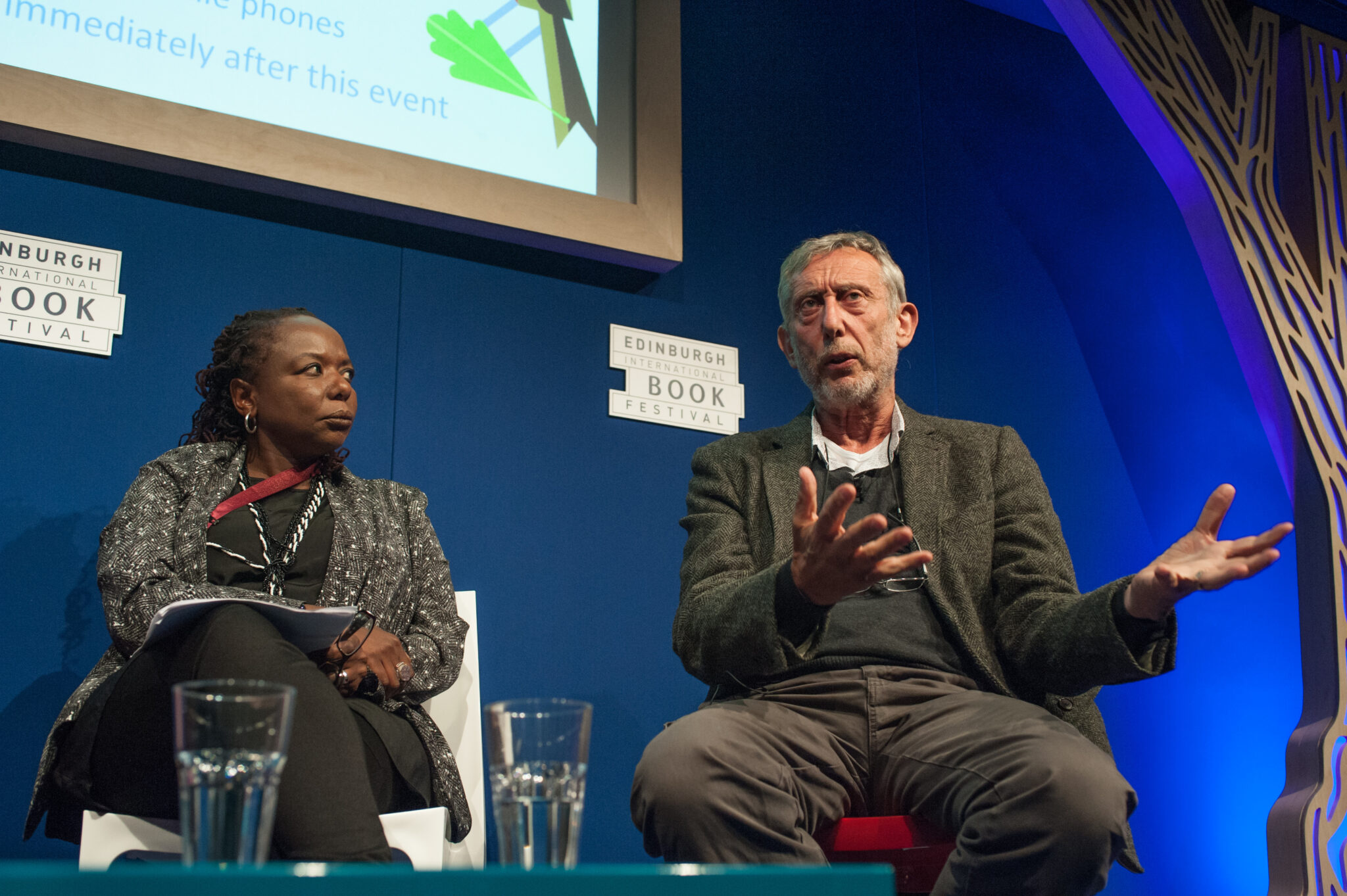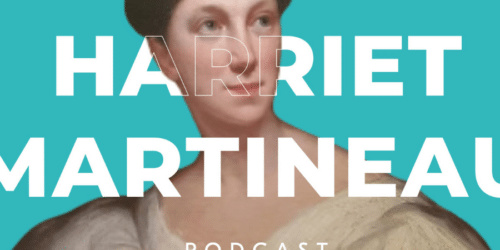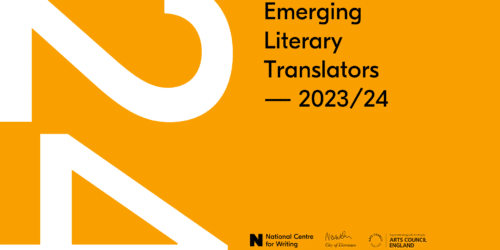
This is an original provocation from Michael Rosen, delivered in person on Monday 25th August at the Edinburgh International Book Festival, at the launch of the National Conversation. (Prefer PDF? Click here or listen to the below event podcast.)
With literature, human beings have invented a way of enabling us to try out and weigh up the possibilities of action and thought. It attaches ideas and feelings to beings we recognise and care about. When we find we care, we usually spend some time speculating about the whys and wherefores, the rights and wrongs, the truths and untruths of the thought and action. We may well wonder about why and how we cared about these beings. I can make a case here for suggesting that these speculations in and after the reading process of literature mostly take place in a slow, reflective, contemplative way. Nothing wrong with speedy reflection. It’s just that it’s good to have some slow stuff as well. One of the reasons for the slowness of literature is that there is a tradition that it is often narrated ‘inside and out’. We view things from outside of protagonists through what they say and do, but we also often view things from inside them through what they think. This gives us multi-dimensional ways of understanding events.
I think I can also make a case for the function of written language here. Written language requires us to live in two time frames simultaneously: one is linear, following one word, one sentence, one paragraph, one chapter after another; the other is multi-directional and involves us in recollecting (going backwards and harvesting what we’ve read), predicting (going forward) and interpreting (going forwards and backwards in order to come up with a sense of it all). Of the many other kinds of mental work going on here, I could also pick out the fact that while we do the work of interpreting what we think of as the meaning, we are also playing along with the physical matter of sound, rhythm and cadence of language. A ‘dirty dustbin’ is not the same as a ‘filthy garbage can’.
One of the most pleasurable ways of engaging with written language in these ways is through literature, probably because of the way it engages our feelings. Another is that we often have the sense that the writer expressed things that we find difficult to express ourselves or, related to this, that a writer expressed something more to the point or more illuminating or more resonant or more beautiful than we could do.
Is all this important?
My bias is to say yes. I’ll justify that by saying that it is important on account of the primacy of language in all our human interactions. Language is not simply a means of communication, it is the means by which we do things. Though we have invented activities which are seemingly less or more shot through with language, (as with the difference between, say, composing music and winding up the case for the defence) ultimately it is impossible to be who we are, to think and to survive without the language we use and hear.
My case would be that the literature that we come to regard as profound, enables us to use and hear the kind of language which helps us think and reflect more, which in turn – if I’m right – helps us do things and ultimately to survive. In addition, because of the special role that literature plays in offering us possibilities of thought and action, it also helps us to think of change – personal or social. I believe that in a world that is for millions of people imperfect and cruel we are in desperate need for anything that helps us think about change.
In our time, we do not have equal access to profound literature. Or, put another way, the pattern of people choosing to turn to literature for deep thought, is very uneven. Some people do. Many people don’t. In crude terms, we might say that there can only be two reasons for this – the behaviour of either writers or audiences: is it that writers of profound fiction aren’t good enough to engage with the audiences who don’t read? or is it that those non-reading audiences have found other places to go for the experience of fiction – TV and film in particular?
Another reason, though, might be in our formation: how we are educated both as readers and writers. Might it be possible that even as we have created mass education and mass reading the people who lay down the curriculum and examine it have created a school regime that puts many people off reading for pleasure?
There may well be others.
But let’s take these three possibilities in turn:
Writers. Is it possible to distill the distinctive aspects of great and popular books of the past and ask if writers today can’t or won’t write books like that? Is there something distinctive about, say, what Chaucer, or Shakespeare or Dickens did? Or do they maintain their status through some kind of hoax, some kind of continuous puff from an elite that justifies its own existence by elevating its favourites into all-time classics?
I think there is some truth in my caricature of the elite. I may even be part of that elite myself. At the same time, these writers in their different ways did something special that is worth hanging on to: they were prepared to consider the lives of people across the whole of society and create situations (scenes, if you like) which enable us to wonder about whether society is just.
In Chaucer’s ‘Pardoner’s Tale’, prologue and epilogue, a man who was supposedly sanctioned by God’s representative on earth to sell pardons for a living, tells his audience a story about how the lust for gold is self-destructive. The job of selling pardons was highly dubious with pardons being in essence, alibis or let-offs for malfeasance before the deed. And who had the power or the right to sell them anyway? The tale the Pardoner tells is circumscribed by several of the Ten Commandments: we shouldn’t be coveting what belongs to others, we shouldn’t steal and we shouldn’t kill. Having told the story, the Pardoner then tries to sell his pardons. This enrages at least one member of the audience who threatens to do damage to his nether parts.
The tale itself engages us with down-the-line questions of good and bad, a good deal of it raising the matter of how we would behave in such circumstances but with the framing – the part where the Pardoner and his audience interact – we are taken into social and political questions to do with whether pardoning is legitimate. However, if the Pardoner had told a dull, hectoring tale, there wouldn’t have been much chance that either his audience or us would be moved or troubled. Instead, his tale is fascinating and full of cunning and tricks that go wrong. It’s convincing. There’s a disconnect between the good tale and the bad person telling it. This gives us ironies to think about; gaps, if you like, in which to do some wondering about the imperfections of the people in the story and the imperfections of this social phenomenon of pardoning.
I suspect that at least some of the ingredients for great literature are here. Modern-day pardoners walk amongst us with falsenesses to sell. We need Chaucers to show the ironies of their trade.
At the end of Shakespeare’s ‘Othello’, the perpetrator of what looks like the worst crime of the day, comes to realise that he was tricked and fooled into thinking the opposite of what was true. The stated reason from the deceiver as to why he did the deceiving is that he was slighted for promotion. However, the way he expresses this brings the racial origins of his superior into the matter. He says, ‘I hate the Moor’, not, ‘I hate my boss’. We have come to know that racialising conflict in this way is not innocent. In this case, it drags the hierarchies of society at large into what would otherwise be a purely professional matter of someone deserving or not deserving promotion.
This is why and how the term ‘tragedy’ referred originally to a social and political form of literature, one which showed us that the roots of a good deal of sorrow and pain can be found in social ambition. Nowadays we might say that an accident is a tragedy and we won’t need to discover or explore any possible social origins for that accident. This leaves us with inchoate feelings around fate or coincidence.
I’m going to suggest that we need ‘tragedy’ in the old sense of the word.
The old system of nurturing writers was for them to winkle out patrons who themselves might be exponents of what you the writer thought was wrong. Today the nurturing is done through a marriage between state patronage and the market. Most writers don’t earn enough to make a living from their writing alone. With one or two exceptions, publishers stay afloat through the selling of film and TV rights. The question here is whether these arrangements nurture the kind of talent that can produce great literature or whether it squanders and discourages it. Do bursaries and grants help? Does the directing of these towards reading and writing groups have a more significant outcome than cherry-picking individuals as beneficiaries? Are there ways in which the most profitable ends of the business can share any of their proceeds by way of seed corn to the next generation of writers? Some kind of targeted or ring-fenced tax?
This links us to the question of audiences and the matter of whether we are too easily seduced by non-literary forms. The problem here is as I’ve stated: there are flows of cash and talent between the highly profitable screen business and the less profitable book trade. Two ironies here: writing is surviving by its relationship with the very thing that may well be strangling it; though the screen business appears to audiences as to be without writing, most of what we see is the result of millions of hours of scripting, and rests in massive part, on the literature of the previous three thousand years.
I thought that Ian McEwan’s ‘Atonement’ and Kazuo Ishiguro’s ‘Remains of the Day’ were great films. I didn’t read the books. If there are millions like me, does this mean that future McEwans and Ishiguros should sidestep the business of writing books and just work on selling screenplays? In which case we would lose at the very least some of that slow contemplation and reflection, the inside-outside dimensions and the prolonged, exclusive engagement with language itself.
So, to the question of our schooling.
The main obstacles in the way of reading for pleasure have been the narrowing down of the criteria of success of a school to its test and exam scores in very few subjects; the narrowing down of comprehension of literature to questions that prove what are called ‘retrieval’ and ‘inference’ with interpretation being sent out of class; the decline of local and school libraries; and the decline of the independent school bookshop movement. In a world where we grant children and young people autonomy over the purchase and use of consumer goods, it’s ironic that when it comes to the consumption of literature within education, there is still a great deal of compulsion enforced through tests, exams, inspections and league tables – hardly the right environment to foster speculation, reflection and the slow engagement with language.
We need a government to allow what Ofsted’s own report on English studies recommended: that every school should develop its own policy on reading for enjoyment for all. If this happened, this would engender a national conversation between all the parties involved in creating readers, otherwise known as pupils, teachers, parents, carers and researchers. It won’t happen unless the government makes it a policy. But I suspect it won’t happen if government thinks that it should meddle with how the conversation takes place. It needs what we might call legislation without interference.
What do you think?
Find out more about the National Conversation
Listen to the event
You may also like...
Reintroducing Harriet Martineau with Stuart Hobday & Gaby Weiner
In this episode of The Writing Life, Stuart Hobday and Gaby Weiner discuss their new book ‘Reintroducing Harriet Martineau: Pioneering Sociologist and Activist’, and the the life and legacy of Harriet Martineau.

22nd April 2024
Meet the Future of Literary Translation 2024
Celebrate another successful year of the Emerging Translator Mentorships programme.

12th April 2024
Crafting identity in fiction with Michael Donkor
In this episode of The Writing Life podcast, we speak with novelist Michael Donkor about how to craft identity when writing fiction.

8th April 2024






